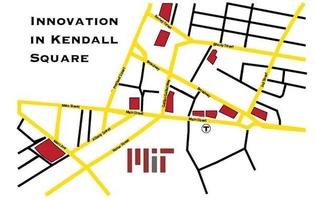MIT leaders, including President L. Rafael Reif, crowded into City Hall on Monday night to lobby the Council to support their plans for the university’s development in Kendall Square.
In December, MIT submitted a petition to change zoning ordinances in Kendall Square to allow for the development of 26-acres of the university’s property. MIT plans to transform four parking lots into lab, office, housing, and research space.
“Together, we can create the world’s liveliest innovation district,” Raif told the Council. Much of the new complex would be devoted to innovation and entrepreneurship, he said.
MIT had originally petitioned for rezoning in Kendall Square in 2010, but failed to win the support of the Council. Councilors had said that MIT’s proposals lacked detail, and that MIT needed to include more affordable housing units in the plan.
The second proposal, submitted to the Council last December, includes new concessions to the broader Cambridge community, including a $10 million community benefits program and a $4 million provision for the city’s Affordable Housing Trust. The Council needs to vote on this ordinance before the petition expires on April 15.
Council members praised the MIT leadership for their presence at the meeting.
“I just wanted to recognize the President being here was a monumental shift from the last time around,” said Councilor Leland Cheung at Monday’s meeting.
Praising MIT leadership for appearing before the Council, Councilor Kenneth E. Reeves ’72 noted that, in recent years, senior Harvard administrators have chosen not to testify on their development plans before the Council.
“At Harvard they’ve tended to think that someone from community relations can go over to the Council,” said Reeves. “But it did not prove enough.”
During the meeting, several Cambridge residents protested the Kendall Square development plans on the grounds of noise pollution.
“I would like to suggest that we not trade quality of life for prosperity,” said Jo M. Solet, a clinical instructor at Harvard Medical School.
“We are poised to put so much noise-making stuff all over this city,” said Heather M. Hoffman, a Cambridge resident. “The people who live in these housing units won’t be able to hear themselves think.”
The Councilors agreed on the need to develop mechanisms for enforcing the City’s noise ordinances. Although they expressed support for the MIT’s development plans, they also referred the matter of the noise ordinance to the Cambridge Environment Committee for further investigation.
—Staff writer Sonali Y. Salgado can be reached at ssalgado@college.harvard.edu. Follow her on Twitter @SonaliSalgado16.
Recommended Articles
-
Man Killed By Red Line SubwayA 57-year old man was fatally injured after being struck by an inbound Red Line train at the Kendall Square station yesterday morning.
-
Let’s Fuel the Fire of InnovationHowever great the bottom-up enthusiasm for innovation, there is a need for top-down support: greater resources, more mentorship, and most importantly, a Harvard hub.
-
City Council Discusses Kendall Square NightlifeCambridge City Council members last night discussed potential plans for MIT to pay $175,000 to the city in order to reinvigorate nightlife in Kendall Square.
-
City Council Votes to Research Development in Kendall, Central SquaresThe Cambridge City Council voted 8-0 last Monday to approve the selection of Goody Clancy & Associates, a Boston architecture and planning firm, to research potential business and residential development in Kendall and Central Squares. “Each square has its own identity,” Assistant City Manager for Community Development Brian P. Murphy ’86-87 said. “Kendall and Central are going under transformation.”
-
Music Returns to Kendall Square T StopThe restoration of the bells at the Kendall Square subway stop is the work of the Kendall Band Preservation Society, a group of MIT students who have spent the past eight months refurbishing the Kendall Band.
-
 Kendall Square: An Incubator for Allston
Kendall Square: An Incubator for Allston













